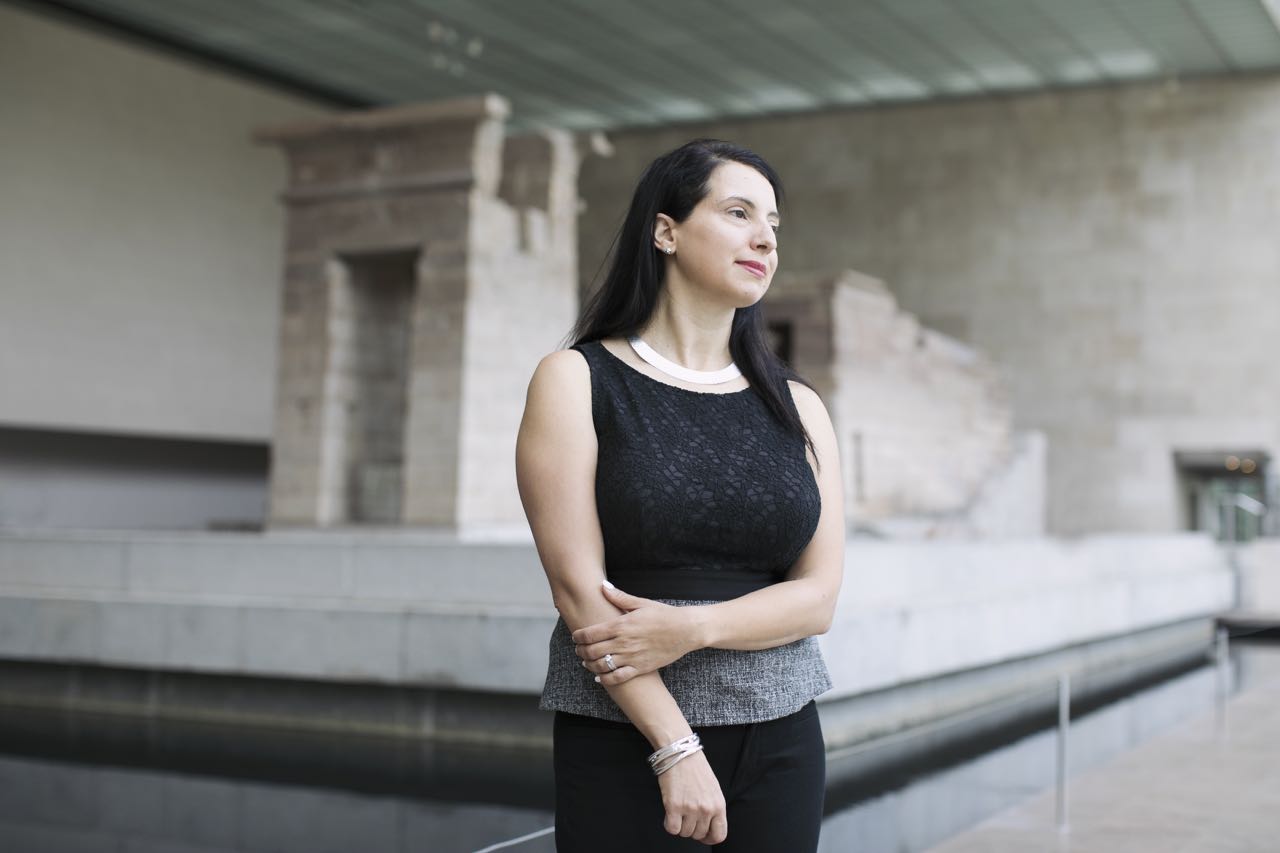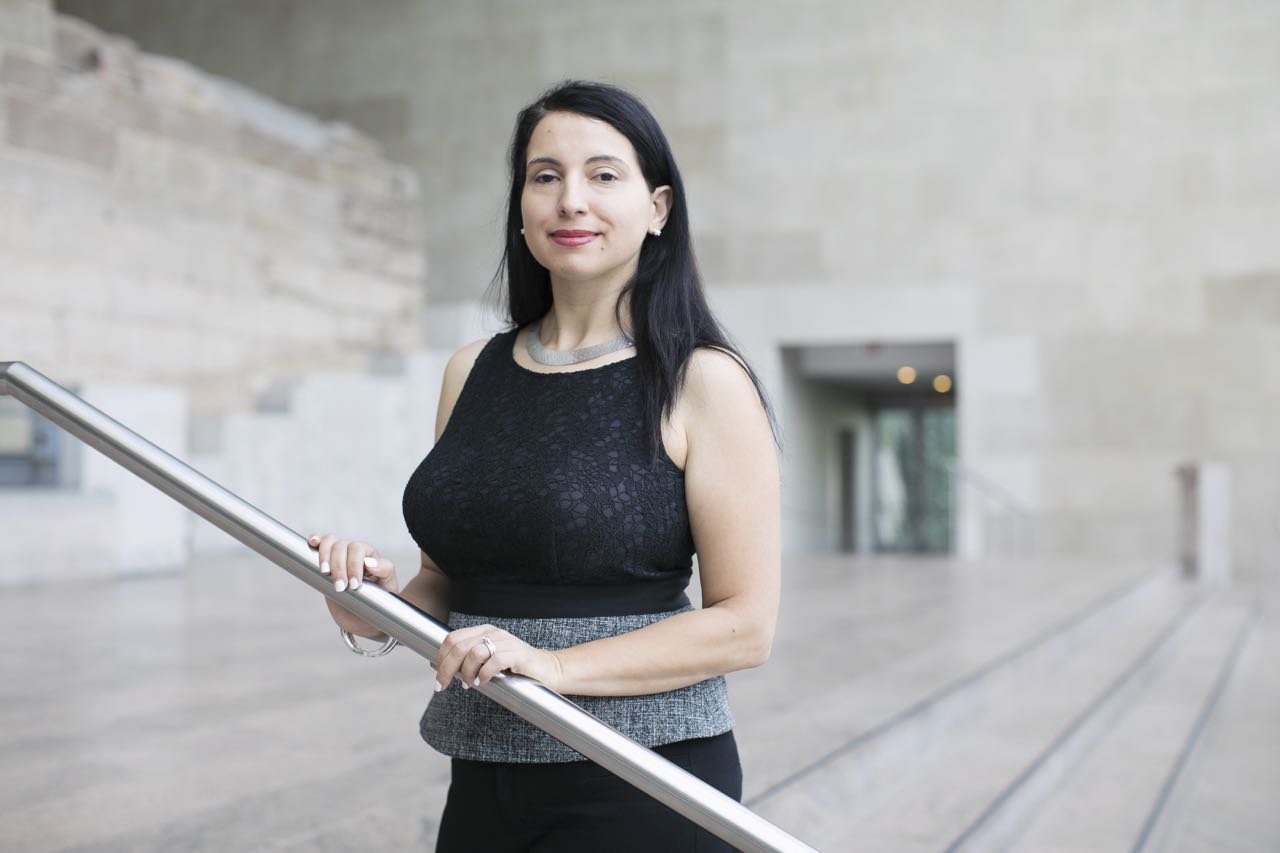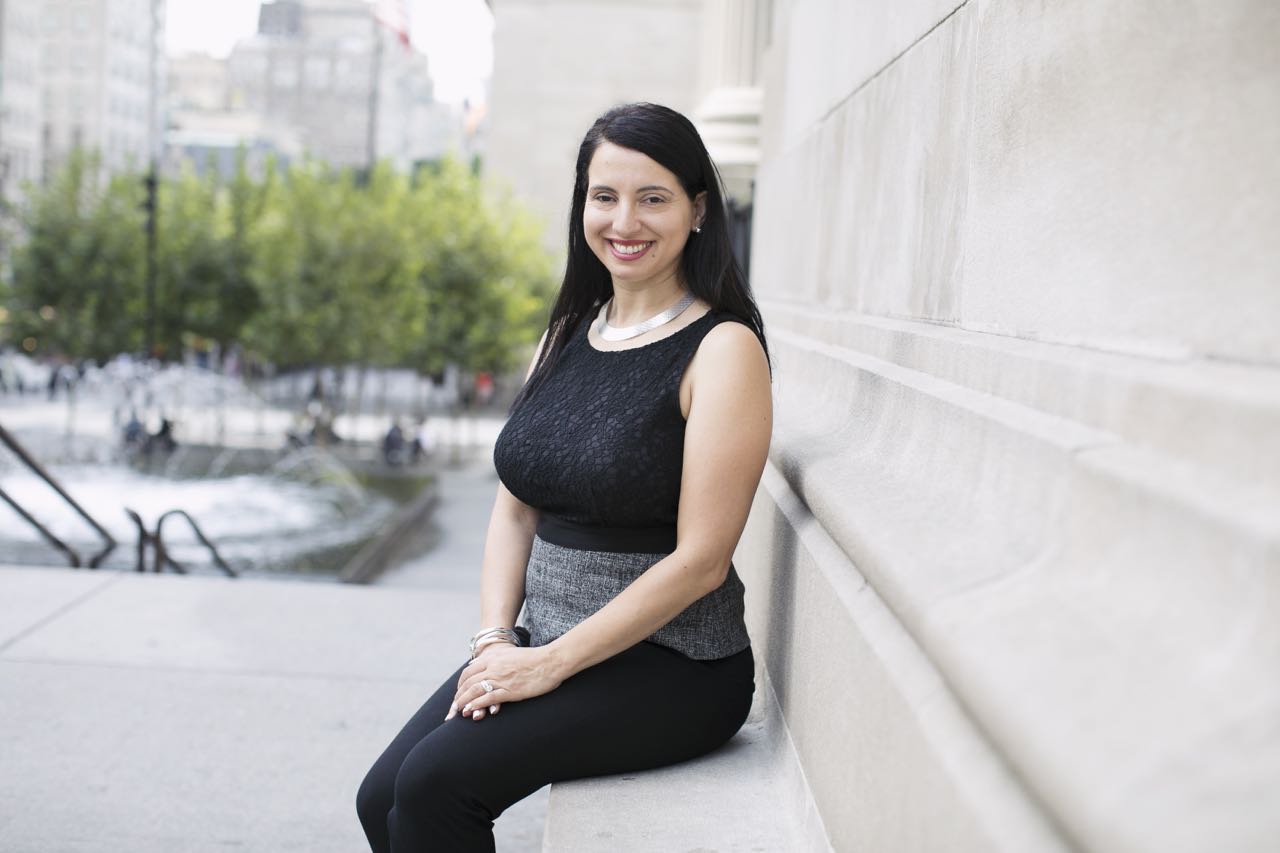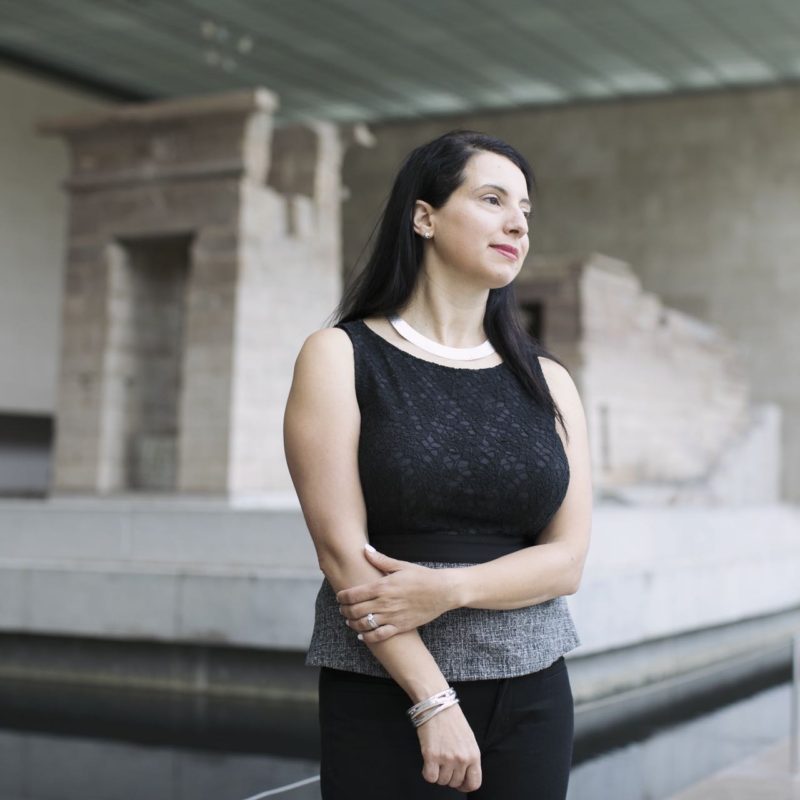Betty Shamieh on Fit for a Queen

Written by Victoria Myers
Photography by Jacqueline Harriet
September 29th, 2016
In Gallery 115 of the Egyptian Art wing of the Metropolitan Museum of Art, there are several statues of Hatshepsut, both as a woman and a man. The female Hatshepsut ruled ancient Egypt as Pharaoh, a title reserved for men and considered higher than Queen. And like many controversial and powerful women, she was then erased by history. Playwright Betty Shamieh is bringing Hatshepsut back into focus with her new play Fit for a Queen, which is being produced by The Classical Theatre of Harlem and running at 3LD Art & Technology Center through October 30th. Betty’s work has been performed and workshopped in numerous theatres, both in New York and throughout Europe. Other plays include The Black Eyed, Roar, and Again and Against. She’s received a Guggenheim Fellowship and two New York Foundation for the Arts Fellowships. We visited The Met with her to talk about her process of writing Fit for a Queen, the legacy of Hatshepsut, new work development, and more.
Where did you get the idea for Fit for a Queen? When you start writing, do you start with character or a visual image?
Generally, my entry into a play is through character, and I feel like I’m always being exposed to, or interested in different kinds of characters. What’s fascinating about theatre is that you only can write what people say, and what people say is so different from what people feel or think or know. I’m always fascinated by the amazing things that people say to each other. Because if you think about it, we’re all living in our heads, and the only way we can communicate is through our speech. Usually, what sparks a new play for me is a character. When I was a young playwright, because this [Fit for a Queen] is an early play of mine, I was also fascinated by stories I hadn’t heard of. I feel like so much of what we know about the world is due to the perspective of people who have visibility. I learned about this female Pharaoh who ruled for 20 years in ancient Egypt. Ancient Egypt was the equivalent of what Rome in its hay day was, and what America is now—it was the superpower of the world, it had the capability to destroy other nations. Thousands of years ago a woman ruled for 20 years dressed as a man. Unlike Cleopatra, or Queen Elizabeth, who were like, “I’m a Queen,” she said, “I am Pharaoh, I am King.” She dressed like a man. What is so fascinating to me about her story, and what was so compelling to me, is that nobody knows this story—and why don’t we know this story? How would we all have evolved differently as human beings and as voters and as men and women if in 5th grade we were exposed to the story of a woman who dressed as a man, blurred gender roles, and said, “I am King. I am the most powerful person, and if you call that ‘king’ then that’s me”? I think we would have all been shaped differently in who we are, and how we think of things like the first female presidential candidate would have been very different. Our lives would have been, I think, as boys and girls, different if we were exposed to stories like this. It’s kind of amazing to me that I’m the first person to write a major play that’s being produced in New York about Hatshepsut. I think that that’s kind of indicative of the cultural blindness to the role that women have played.
Right, I didn’t know about her.
What I often say is you don’t have to embellish the truth, you just have to tell the full truth for people to have a perspective. It was not this kind of uninterrupted patriarchy throughout the world. She ruled for 20 years. Also, what is fascinating about her is her enemies, which was her son-in-law’s regime. He wanted to reestablish the patriarchy. Tried to destroy her. They tried to, and they almost succeeded, in smashing all the images of her dressed as a man. What you see in the Met, most of it was reconstructed, painstakingly. And she was stripped from the names of the Pharaohs list. That’s also an amazing story too. That archeology recreated this thing that in their own time they tried to erase and wipe out. There’s a placard in the Met, that it’s one of the triumphs, one of the biggest things in archeology, the reconstruction of this particular history, that in its own time thousands of years ago the most powerful person was getting erased. We still don’t know that story, and I think there’s reasons for that.
And it’s a major story.
I lived in Europe for a lot of the last 10 years. My last play in New York was in 2007, it was Black Eyed at New York Theater Workshop. Since that time, most of my productions and commissions have been made working in Europe. It’s partly because I write these big ambitious plays. America is a country that gave us O’Neill and Tennessee Williams; small family dramas are our great works. It’s very challenging to be a woman, be a young playwright, be where I’m at in my career, and try to sell a big historical drama about a woman. I found Europe to be a much more welcoming place in the last few years for my kind of big storytelling. I’m delighted that Classical Theatre of Harlem is taking it on, and it’s wonderful that it’s me and Tamilla Woodard, who is a brilliant female director and who’s just now getting the kind of production opportunities that the Classical Theatre of Harlem is providing. I think it’s a fantastic story. I think it’s not easy to put this kind of story about women at the center in American theatre. Particularly because we’re used to seeing ourselves through the male gaze, and this play is not through the male gaze. This play is a very cynical look at all people in power. It’s about how all people in power, whether they’re men or women, behave badly. I think one of the characters says it, “Why do we have to pretend as women to be better, or more moral than men, to expect the same rights as them?” It’s a very cynical look at humanity, and it’s funny. Because people in power act ridiculous.
I was wondering if you could talk a little bit about your research process for the play? You were saying that basically everything of Hatshepsut was destroyed.
Not everything, but most things, yes.
Did you go through a process of deciding how to interpret the history that did exist, given that so much of it was archeologists putting it together through the lens of their own time period?
Yes. Egypt was a very literate country. Almost every museum throughout the world has a Hatshepsut statue. You can imagine how many statues these incredibly wealthy Pharaohs had for, still, most of them to be destroyed. I don’t understand the technicality, and I have tried, of how hieroglyphs turn into the story of Hatshepsut that I get in a history book. I first learned about this in a college course, and it made me surprised and angry. Because I’m the kind of person who’s on the lookout for people like Agrippina, who was Nero’s mother who tried to poison him. I’m somebody who’s always got my ear open about fantastic people that you might not have heard of because I’m a playwright. The fact that I didn’t know this woman, and I’m also Middle Eastern so that’s on my radar too, stories that kind of displace or complicate how people think about Africa or the Middle East. I’m the most likely person to have known this story. The next play I’m writing is about Harvard [in the 1600s] and the about 20 year period where they accepted Native American students, because there were radical people in England who thought Native Americans were the lost tribe of Israel, and if you converted them to Christianity, Jesus would come back. There were five students who went through, and only one graduated because the rest of them died or were killed by their tribe. I was a person of color at Harvard University, I was involved in all the indigenous stuff, and I did not know that history. I’m attracted to stories that nobody knows about, and I feel like if you knew it, it would radically shift how you think of yourself in the world. What if Hatshepsut’s daughter had taken over, and her daughter had taken over? I’m very interested in those kinds of moments where everything could have been different, and how it isn’t, but how our conception of our whole world would have been different if this one person had succeeded. That, to me, is fascinating. I really think we would have evolved differently as a culture if we knew stories like Hatshepsut. Girls wouldn’t think it’s such a strange thing to be a President, or to dream to be a President. Maybe they would want to be something different than what we’re taught is fancy and fabulous.

When you sit down to write, do you do a quick first draft?
I do. I tend to write a very quick first draft, and I write quickly. I used to write like three or four plays a year. Now, I’m sticking to one a year. I feel like if you told me, “Betty, your next three plays will be produced. Go,” I would write them quickly. But it’s like, “Oh my God, I’ve got to pitch it to this theatre.” I also find that plays end up in the most natural places [for them]. Sometimes as a playwright I envision my play would be at a certain kind of theatre. This play [Fit for a Queen] is a comedy, people of color have to be in it, it’s ridiculous, it’s fantastic, and it’s a classical piece. It does not belong anywhere except the Classical Theater of Harlem. Black Eyed is set in the afterlife, written in verse with a chorus. If it’s going to be produced Off-Broadway, it belongs at New York Theatre Workshop. I’m finding that I have a vision for my career, but the plays find their own homes, which is really heartening. This is a big, campy, historical drama about a woman Pharaoh. Set through the eyes of her conniving slave girl. Another theme of the play is that people can have bad intentions and do good things. Because I believe if you’re trying to be a politician you can do great things, but the compromises you have to make, you need be kind of a different human being to gain and amass that kind of power. Make deals and promises—that’s just the nature of it.
When you’re writing and you’re dealing so much with gender, were you thinking about how an audience interprets female behavior?
I’m working on another play called Codes of Honor. It’s about a female soldier, and she’s a debutante from Texas who decides she’s going to be in the Army, and then what happens to her. I’ll never forget, [when I was starting out] I submitted a play to a contest for young playwrights, and I got a feedback form that said, “The female character is unlikable.” My characters are very human and flawed, and when they’re female, people don’t allow that, even other females. Actresses love to play my roles, because I give them all the perplexities of somebody like Richard III. I find that I don’t censor how I present women, because I have a very misanthropic view. I’m a happy misanthrope. I have a misanthropic view about people and what they’re willing to do in order to protect their own interests. In that way it undercuts, because I’m also an Arab-American, so I write very realistically about what it means to be a person who is viewed through a certain lens. I’m not triumphing a certain culture or another, or saying we’re fantastic and you’re not, or women are great and if we were in power everything would be fantastic. I look at us all as human beings. We don’t all have the same rights, but we all have the same desires and urges and capabilities for cruelty. I write very well-rounded women who are capable of all the range of human emotion. The perception of those women is very interesting. I feel like when I was younger, being an ethnic minority was a larger part of my identity. Because I was the only Palestinian and Arab-American working Off-Broadway when I came out of drama school, that was the big thing that I felt that I was representing this culture in a time of war, essentially. It’s been a continuous war since I came out of drama school basically. As I got more mature as a playwright, what I realized was that was not the case as much as me presenting these female characters. The harder thing to do is to present complicated female characters. That’s why I think Hillary is having a different challenge than Obama did.
People hold women to a different standard.
If you had told me ten years ago that being a woman playwright was more challenging than being an Arab-American playwright in a post-9/11 era, I would have probably not agreed with that. At this stage in my career, that is something that I see. My next project is going to be at the 4th Street Theatre with May Adrales, and I’m working with Tamilla Woodard now. These are incredibly talented, brilliant directors. I went to drama school with incredibly talented, brilliant male directors who are in a different stratosphere in terms of resources and opportunities. The hard thing about being an artist is you need opportunities to work in order to attain your greatest potential. I’m very lucky because I was able to work in Europe. I’m lucky, and unlucky, because also there’s a whole body of my last ten years of plays that New York hasn’t seen. I’m lucky in that those plays found some homes, and so I as a playwright could continue to evolve. Even though the opportunities in this country were not affording the opportunity to evolve. When I see amazing woman directors, and I get the opportunity to work with them, I just keep my fingers crossed that they will continue to have all the opportunities they need to get developmentally to where the men are able to get faster, easier, and younger. It’s ridiculous to me that half the people coming out of medical school and law school are women, and we have the numbers that we have in the arts. It’s a sign of where we really are in the culture, and it’s very disheartening that I could be a doctor or a lawyer and have more in success in those fields. Not that it’s easy to be a woman doctor or a lawyer, but it’s astounding that we are so slow as a culture in terms of theatre. Theatre is slower than film at a lot of things. It’s a conservative art form, in terms of it’s very hard to change, it’s very expensive, and there are in entrenched institutions that are slowly moving in the right direction.
Right, it’s very slow.
It’s very much a culture of tokenism. I worked in literary offices—that was the first thing I did when I graduated, I interned. It’s very much, “Oh my gosh, let’s get one black playwright or one female playwright, so that nobody can say we didn’t do something.” That’s how I feel like our artistic world is being curated. It puts women in the position, or people of color in the position, of fighting for that one slot. Also, I remember somebody saying it’s so hard to be a white male writer. I said, “Yeah, it’s hard to be a writer.” What I feel happens to women, and I’ll conflate it with artists of color, because to me I am both and they’re interlinked, what happens is you get a little bit. Maybe you get a little grant here, or maybe the NEA helps you develop here a little bit. Once you have that foothold as a white male artist, where you go can be launched much quicker. Whereas I feel like for females and people of color, if they’re directors, they aren’t anointed as the golden boy who gets every single opportunity to develop, and use his mind and get his tools. So when he has that fantastic project and everything comes together, he’s the best artist he can be to match that. I feel like that doesn’t happen. There’s all this resentment towards women for that little sliver of help somewhere. As opposed to like, yeah, there’s a sliver, but one little grant is not going to make or break your career. It’s going to help you, and you’re going to feel great about it for ten minutes, and then you’re going to have to still struggle. I think it’s also interesting to me that there is this kind of underbelly of it. There’s still this enormous amount of resentment for not having basically the pick of everything. It’s a very interesting thing.
Do you find that your work is described differently than if it were written by a man?
What I found interesting about Black Eyed was that, of course, it was one of the first representations of Arab women on stage, but it was also one of the only plays Off- Broadway, by a young playwright, that was all women. I have the double challenge of presenting plays that are about “scary people” at a time where everybody is scared, and people don’t even notice that what I’m actually doing, as a women playwright, is putting four women on stage, an incredible thing that doesn’t happen in American theatre. I didn’t get the kind of kudos for that, because it’s seen as an Arab play.

What’s something that you think can be done to improve the new play development process?
I think what playwrights and artists need to do is be more creative about where and how their work gets produced. Within one season, I had a play that I produced myself for $500 at The Tank with Sam Gold. It was one of his first New York productions, that I acted in and wrote, and then I had an Off-Broadway play at [Get name of theatre]. What kind of happened to me is once I was working on the Off-Broadway level, it felt like a step down to be produced in the way that I started, which was a very gritty—let’s get the most brilliant people you know, and make theatre. I think what needs to happen is there needs to be more in-between ways to work in New York than just Off-Broadway and off, off, off. The big theatres need their funding, and everybody knows that, because we do need to create a body of literature. I think that what needs to be supported is smaller institutions like Classical Theatre of Harlem, that is going to give wonderful artists like Tamilla, and this amazing tremendous cast, a chance to do a play that is ambitious and big and historical and of the moment. Big institutions don’t have that kind of nimbleness to say this looks like an important piece to do right now. They kind of plan their seasons way in advance based on what movie star they can get. That’s fine, and that has its place. I worked on that level, and I hope to work on that level many times again, but I think what I need also is the freedom. Because I do want to write my big historical drama about five Native Americans, all of whom died in the 1600s because people thought that they were Jews and wanted them to become Christians so that Jesus could come down and destroy everybody who wasn’t Christian. I want to write those kinds of plays, and I think we as artists need to find ways to make the kinds of plays we want to make. Which is not fun, and not what people dream about. People dream about somebody else doing all the work, and you sitting down and writing, but you have to shape [your career]. Just like you have to shape your relationships, and prune people who are not fantastic anymore for you, and cultivate people who are. You need to find the producing partners who you need right now in the moment as a person and an artist. I think what we need are more different kind of ways to create theatre, and I think we need more cultural support for mid-level institutions that can do ambitious projects in a nimble, timely way.
Photographed at The Temple of Dendur at the Metropolitan Museum of Art in New York, NY.

